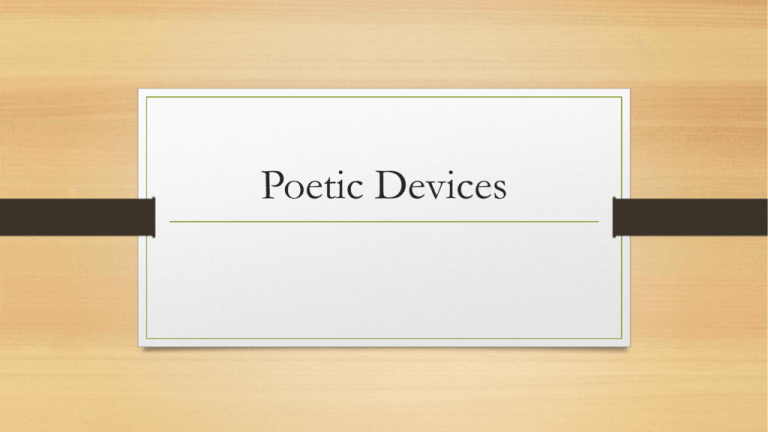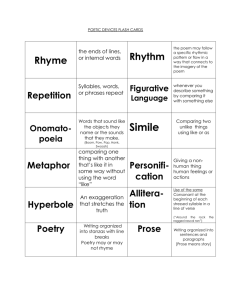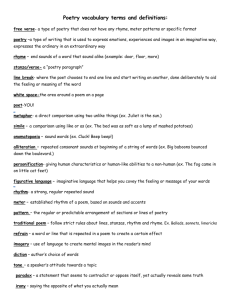Poetic Devices
advertisement

Poetic Devices Alliteration • Definition: Repetition of a particular sound (consonant) in the stressed syllables of a series of words or phrases. • Example: James Thomson's verse "Come…dragging the lazy languid line along". Allusion • Definition: A figure of speech that makes a reference to a place, person, or something that happened. This can be real or imaginary and may refer to anything, including paintings, opera, folk lore, mythical figures, or religious manuscripts. The reference can be direct or may be inferred, and can broaden the reader’s understanding. • Example: “He was a real Romeo with the ladies.” Ballad • Definition: A ballad is a poem or song that focuses on a specific story. Often, ballads are about love--either lost or found-- or about an event or interaction that says something about the human condition. They are thought of as romantic and are often tragic. • Example: The song Imagine, by John Lennon, is an example of a ballad. Couplet • Definition: A style of poetry defined as a complete thought written in two lines with rhyming ends. • Example: So long as men can breathe or eyes can see, So long as lives this, and this gives life to thee. Elegy • Definition:A poem of serious reflection, typically a lament for the dead. • Example: “If I cried out/who would hear me up there/among the angelic orders?/And suppose one suddenly/took me to his heart/I would shrivel.” Rainer Maria Rilke Free Verse • After the Sea-Ship—after the whistling winds; After the white-gray sails, taut to their spars and ropes, Below, a myriad, myriad waves, hastening, lifting up their necks, Tending in ceaseless flow toward the track of the ship: Waves of the ocean, bubbling and gurgling, blithely prying, Waves, undulating waves—liquid, uneven, emulous waves, Toward that whirling current, laughing and buoyant, with curves, Where the great Vessel, sailing and tacking, displaced the surface. -Walt Whitman Poetry that does not rhyme or have a regular meter. Hyperbole • Definition: An extreme exaggeration used to make a point. It is like the opposite of “understatement.” Hyperboles are comparisons, like similes and metaphors, but are extravagant and even ridiculous. • Example: I am so hungry I could eat a horse. It was so cold the polar bears were wearing parkas. Imagery • Definition: The "mental pictures" that readers imagine whilst reading a passage of literature. It signifies all the sensory perceptions referred to in a poem, whether by literal description, allusion, simile, or metaphor. Imagery is not limited to visual imagery; it also includes auditory (sound), tactile (touch), thermal (heat and cold), olfactory (smell), gustatory (taste), and kinesthetic (movement) sensations. • Example: The gushing brook stole its way down the lush green mountains, which were dotted with tiny flowers that smelled of vanilla and trees alive with gaily chirping birds. Lyric Poetry • Definition: A type of poetry that explores the poet’s personal interpretation of and feelings about the world, often through song or music. They are usually in the present tense. • Example: Elizabethan sonnets, like Shakespeare’s collection of sonnets Metaphor • Definition: Describes a subject by asserting that it is, on some point of comparison, the same as another otherwise unrelated object. • Example: Our canoe flew down the river. My life is a roller coaster. Narrative Poem • Definition: A poem that tells a story and has a plot. • Example: Most Taylor Swift songs. Onomatopiea • Definition: A word that imitates or suggests the source of the sound that it describes. • Example: the explosion boomed over the countryside. Rhythm • Definition: A strong, regular, and repeated pattern of movement or sound in a poem. • Example: A sonnet’s pattern is in Iambic Pentameter. Oxymoron • Definition: A figure of speech that combines contradictory terms that still produce an inherent truth. • Example: “Cruel kindness” or “jumbo shrimp.” Rhyme Scheme • Definition: The rhyme scheme is the practice of finding the pattern of rhyming words placed at the end of the lines in the prose/ poetry. Rhyme scheme refers to the order in which particular words rhyme. • • • • • Example: Roses are red (a) Violets are blue (b) Beautiful they all may be (c) But I love you (b) Simile • Definition: A figure of speech that directly compares two different things, usually by employing the words "like" or "as" – also, but less commonly, "if", or "than". • Example: Her skin was white as snow. Stanza • Definition: A division of a poem consisting of two or more lines arranged together as a unit. More specifically, a stanza usually is a group of lines arranged together in a recurring pattern of metrical lengths and a sequence of rhymes. • Example: Stanzas are to poetry what paragraphs are to prose. Symbol • Definition: Symbolism is the use of symbols to signify ideas and qualities by giving them symbolic meanings that are different from their literal sense. • Example: Dove is a symbol of peace. A red rose stands for love. The color black represents death. Tone • Definition: The attitude, emotional quality, or feeling of a particular text. It can change throughout the text. • Example: The tone of “Introduction to Poetry” by Billy Collins starts off by pleading, but becomes resigned. Understatement • Definition: The presentation of something being smaller or less important then it really is. • Example: Robert Frost’s poem “Fire and Ice”.



